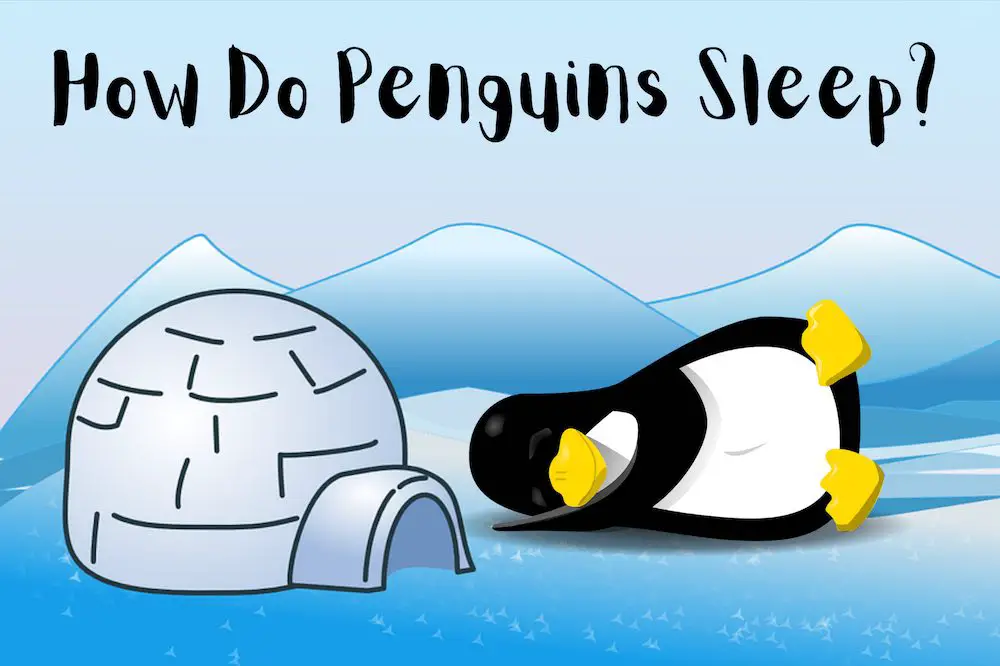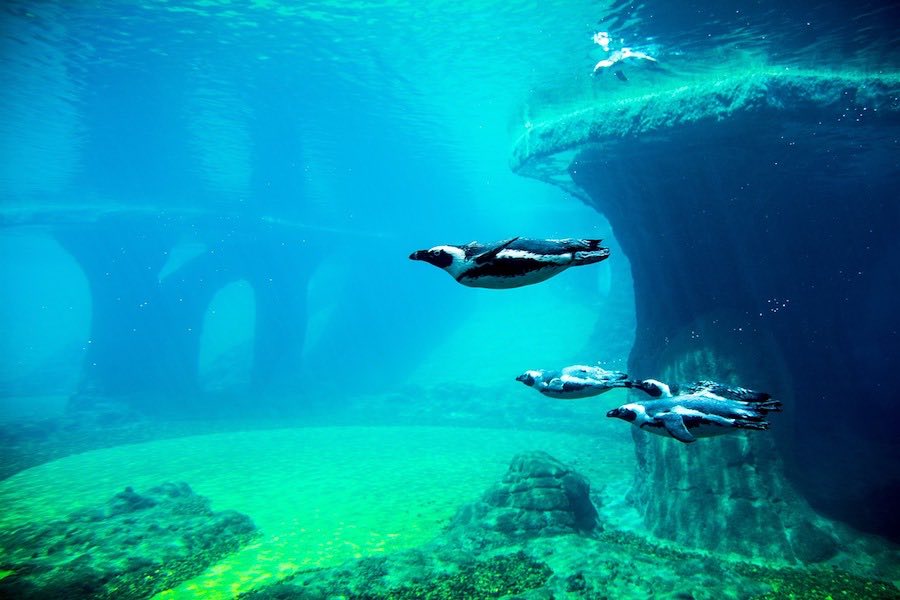Penguins are quite remarkable creatures and so different from humans in so many ways. One of the questions I’ve always wanted to know the answer to is how do penguins sleep.
I’ve seen them on TV all huddled together, and people often talk about them sleeping standing up. I wanted to know if it was true that penguins sleep standing up and so I did some research around this.
So how do penguins sleep? Penguins sleep in short bursts of just a few minutes during the day and evening, protecting them from predators. They can sleep on ice, in water and in small holes. They can sleep standing up, minimising contact with the ice. They will sleep in groups to protect from the cold and predators.
There is a ton of information in the above paragraph, and although it does briefly answer the question of how do penguins sleep, I have gone into much more detail below.
Read on if you want to find out exactly how they sleep, where they sleep, and how it is that they can even sleep in water! I’ve also gone into some more detail about why they sleep for such short periods of time, unlike me!
Contents
How Do Penguins Sleep?

As you can see from the small amount of information given above, penguins don’t really follow the same kind of sleep patterns that we do. I mean why would they? They don’t exactly follow the same kind of lifestyle as we do at all do they?
Now there are a great number of different types or species of penguins. According to Wikipedia there are 21 different species of penguins known to still be living today. Some of the information below is general to most penguins, and some is specific to the individual breeds.
So how do penguins sleep, and why is it that they choose to sleep this way? I’ll go into some specifics below about some of the sleeping positions of penguins, and also some of the places they like to sleep.
We need to remember that in almost all of the places that penguins live, it is very cold. Most of the different species of penguins live in Antarctica, which is obviously extremely cold all of the time.
Among the types of penguins living in Antartica you will find emperor penguins, chinstrap penguins, gentoo penguins and adélie penguins.
But penguins do live in other places too. You can find penguins such as the little penguin living in Southern parts of Australia, where the water is cool enough for them to survive.
South America also provides a home for many of the different types of penguins too. In Argentina you can find magellanic penguins, and the Falkland Islands is home to at least five different species of penguins.
In looking at the question how do penguins sleep, the answer really is in whatever way possible they can stay safe. Safe from the elements around them in terms of the cold weather, and safe from any predators looking to take advantage of them sleeping.
One of the things a penguin will do when it is sleeping is to tuck its bill or beak behind one of it’s flippers. While some researchers say that this serves no purpose to the sleeping penguin, there are others that feel it does.
One of the things a penguin needs to do while sleeping is try their best to stay warm. Tucking their bill behind their flipper is possibly their way of conserving body heat by cutting down on the amount of heat lost from their face, and in particular their nostrils.
Like I said, how and where a penguin chooses to sleep is generally defined by it’s surroundings. I’ve written some more below about some of the ways a penguin will choose to sleep and why, as well as where they might choose to sleep.
Where Do Penguins Sleep?
I know this might seem like a particularly mental question, as surely the answer is on the ice! It is, however not quite as straightforward as this. Yes penguins do spend a lot of their time sleeping on the ice itself, but this is not the only place.
I’ll go into some more detail about how penguins sleep on the ice below, but let’s just consider for a second the other places that they might sleep.
Believe it or not, penguins can and do sleep in the water. Not big long sleeps, but they do sleep in the water. This calls into question how long penguins sleep for, which we will discuss a little further below.

Maybe not all penguins will sleep under water, but some do. Emperor penguins in particular are able to hold their breath for over 20 minutes under water. Emperor penguins can hold their breath under water longer than any other species of penguin.
To do this they will slow down their heart rate to such a low speed that their organs can go into a sleep like state until they are needed again. Whilst under water in this state it is entirely possible for penguins to take a short sleep.
Many scientists believe that seeing as they are away in the ocean for long periods of time, they can and will do this. This has been observed in zoos and animal sanctuaries.
Penguins also have good eyesight, which helps when swimming in deep waters to look for food. Penguins also have tails, and these help them to swim too.
While at sea for long periods, penguins will need to drink see water. Penguins can turn seawater into freshwater to ensure they do not have too much salt in their bloodstreams.
On the ice and in the sea are also not the only places that penguins will sleep. Some smaller penguins will also sleep in little holes near the shoreline, such as the little penguin that I mentioned above as staying in southern Australia.
Penguins keep their nests clean by firing their poop up to four feet away from where they stay. Penguins do not pee, and instead fire all of their waste out of their anus in a kind of liquid paste.

When Do Penguins Sleep?
Another funny question, but it does help us in our overall understanding of the question of how do penguins sleep. Like I said above, penguins don’t follow our sleep patterns, or really any of our behavioral patterns.
While we sleep at night, or most of us anyway, and get on average 8 hours a night sleep, penguins do not do this. Penguins do not go to sleep at night, and do not follow the pattern of having one big long sleep. Instead they will take shorter naps throughout the day, and possibly into the night as well.
It is much safer for a penguin to sleep for shorter periods of time for a couple of reasons. Firstly, staying still and sleeping for too long would mean that the penguins would become excessively cold, in very harsh conditions in Antarctica.
Secondly, sleeping in short bursts can help them to stay safe from predators if they are either out on the ice, or sleeping in the sea. Humans don’t really hunt penguins, as you are not allowed to eat penguins by law these days.
Penguins don’t see too many land mammals, especially in the arctic, and if they were to see a human they would be more curious than fearful. Penguins probably wouldn’t attack humans for no reason, but would wonder why they were there.
Perhaps one similarity that penguins have to humans is that they like to sleep on a full stomach. I personally prefer going to bed hungry rather than full, but penguins appear not to share my liking for this.
I am aware that this makes me unusual, as most people prefer to maybe have a nap after they have eaten. So it is with penguins, and after meal times is a good time to find a penguin sleeping.
How Long Do Penguins Sleep For?
This one also helps us in answering the question of how do penguins sleep. Although we can’t be sure exactly how long penguins sleep for each time, the common consensus appears to be that they sleep for minutes at a time, rather than for hours.
This has been observed by a number of scientists and people observing penguins, both in the wild and in zoos and animal sanctuaries.
This doesn’t mean that penguins can survive on just a few minutes sleep a day. Not at all, in fact quite the opposite. I read this article that said that emperor penguins can sleep for up to 20 hours a day. That’s quite a lot of short naps.
Now as I said above, a penguins sleeping pattern is largely dictated by it’s surroundings. The less threats that appear for penguins, the longer they will sleep for. When a penguin sleeps it does conserve a lot of energy, so it makes sense that it would want to spend a large amount of time doing this if possible.
Do Penguins Sleep Standing Up?
Now this was one of the questions I did know the answer to, as I’ve seen this a number of times, at least on TV. Penguins can and do sleep standing up, and there is a very definite reason why they do.
Certainly for the penguins of Antarctica, and any other cold regions, if they are sleeping on the ice the ground is very difficult to sleep on. To stay warm, a penguin can and will try to minimise the amount of contact it has with the ground.
It is for this reason that penguins will choose to sleep standing up. Penguin’s feet are particularly toughened and hardened to the cold, so if they are touching the surface while they are sleeping, they won’t feel it.
If you were to look at the skeleton of a penguin, you would see that it looks to be permanently in a crouching position. Whilst penguins do have knees, these are generally higher up than the hip joint, allowing them to crouch comfortably in order to sleep.
In fact penguins are so smart and adaptive that they can even be seen leaning back and sleeping on just the heel of their foot, making sure that this is the only part of them making contact with the ice.
Not all penguins will do this, and perhaps the one that you will see doing this the most often is the emperor penguin. So penguins can and do sleep standing up, in order to minimise their contact with the freezing cold ice.

Penguins can also sleep lying down, and in less cold and harsh conditions they can be seen lying down and sleeping on their tummies too. This gentoo penguin pictured above is doing exactly this!
Do Penguins Sleep In Groups?
The last question I am posing in order to understand the question of how do penguins sleep is do penguins sleep in groups?
This is another example of penguin behavior that I have seen on TV. In fact one of the images that I think of when I try to picture penguins is the sight of them huddled together on the ice.
Penguins are sociable and loyal creatures, and many of them will have the same mate for life. In fact did you know that penguins will bury their dead, and even hold their own special funerals?
They will do this for a number of reasons. Firstly staying together allows them to share their body heat when it is particularly cold. This is one of the reasons that they will also sleep together in groups.
Secondly, staying together in large numbers like this also affords them some protection from predators. This is another reason why they will sleep together in groups like this.
You will often see large groups of emperor penguins on nature shows standing together in groups to incubate their eggs, and a lot of this time will be spent together sleeping.
Summing Up
So there you have it. Quite a long and complicated answer to the seemingly simple question of how do penguins sleep.
They sleep for short periods of time, minutes rather than hours. They do this throughout the day and into the evening. They do this in order mostly to stay safe from predators.
They can sleep on the ice, in little holes and even in the water. They can sleep in the water by slowing their heart rate down so much that their non vital organs shut down.
Penguins can and do sleep standing up. This protects their bodies from the cold ice that they often sleep on. They even rock back on to their heels to protect their toes from the cold.
Penguins will also asleep in groups, to both protect them from the cold, and from predators too.
I hope you have found the information above useful. If you have any questions or would like to add something then please leave a comment below.



